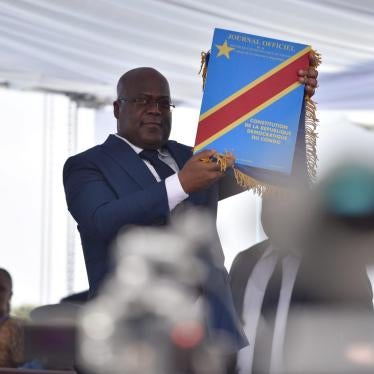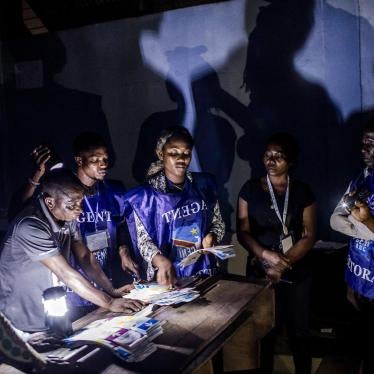April 3, 2019
His Excellency President Félix-Antoine Tshisekedi Tshilombo
Re: Protecting Human Rights in the Democratic Republic of Congo
Your Excellency,
On behalf of Human Rights Watch, we are writing to welcome the initial steps your administration has taken to advance human rights in the Democratic Republic of Congo since you took office on January 24, and to encourage you to make the protection and promotion of human rights a top priority throughout your presidency. We especially hope that you will work to make systemic changes to end the cycles of violence and abuse, fueled by widespread impunity and corruption, that have plagued the country for far too long.
We urge you to take strong, bold, and concrete steps – from early in your presidency – to mark a clear break with the abusive and corrupt practices that characterized the presidency of your predecessor, Joseph Kabila.
During your inaugural speech, you committed to “guarantee to each citizen the respect of the exercise of their fundamental rights” and to end all forms of discrimination. You stated that your government would prioritize “an effective and determined fight against corruption… impunity, bad governance, and tribalism.” Since then, you have taken some important steps, including the release of political prisoners who had been arbitrarily detained for several years and the dismissal of the head of the intelligence agency who had a long history of involvement in serious abuses.
Yet the challenges ahead are enormous. Today, there are over four million internally displaced persons (IDPs) in Congo, with another 826,000 Congolese refugees in Africa. Some 140 armed groups are active in eastern Congo’s North Kivu and South Kivu provinces, and many of them continue to prey on civilians, carrying out massacres, mass rapes, abductions, forced recruitment of children, and burning and looting of homes. Tensions remain high in northeastern Ituri province, the central Kasai region, and the western territory of Yumbi – all of which have seen horrific levels of violence in recent months and years. The underlying tensions have not been addressed, and perpetrators remain at large.
Instead of working to restore security, government security forces have all too often committed abuses against the civilians they are meant to protect. Senior political and intelligence officials and security force officers have created, supported, armed, manipulated, and orchestrated armed groups across the country, sometimes as part of an effort to gain control over lucrative mineral resources or land. To make matters worse, officials from neighboring countries have also repeatedly supported abusive armed groups in eastern Congo. Senior officials most responsible for some of the worst abuses have often been protected and promoted, rewarded with senior positions and access to money and power instead of being held to account for their crimes. The lack of independence of the judicial system means that many of these individuals feel they are untouchable.
The country has also seen significant restrictions on the rights to freedom of expression and peaceful assembly in recent years. Between 2015 and 2018, as Kabila retained power beyond the end of his constitutionally mandated two-term limit, security forces shot dead nearly 300 people during largely peaceful protests and arrested over 2,000 political opposition leaders and supporters, pro-democracy activists, and journalists. Many were held for weeks or months by the intelligence services, without charge or access to their lawyers or family members, and often in inhumane conditions where they were subject to mistreatment and torture. Government officials shut down media outlets seen as close to the opposition, forced opposition leaders and prominent activists into exile, and routinely banned peaceful protests led by the opposition, civil society, and the Catholic Church. While you have taken some encouraging steps to reverse these trends, victims and their family members are awaiting justice and redress.
Many of these challenges have been fueled and perpetuated by a culture of corruption pervading all parts of public administration in Congo. Corrupt deals and a complete lack of transparency in the management of natural resources have enriched the elite in power, while the Congolese people have gained little from their country’s massive mineral wealth – and Congo continues to have one of the poorest populations in the world. Corruption in the judicial sector means that judicial rulings often depend on which side can pay more, and not the impartial interpretation of the law. Corruption in elections – as we again saw so blatantly in the recent senatorial elections – has given many Congolese little reason to believe in the democratic process as a true reflection of the people’s will.
To address these challenges and demonstrate a real commitment to promoting rights and turning the page on decades of violence, abuse, mismanagement, and impunity, we urge you to take the following steps during your first year in office:
- Remove from their posts security force officers and other executive branch officials who have been implicated in serious human rights violations, according to reports by the United Nations Group of Experts on Congo, the UN joint human rights office (UNJHRO), the UN Human Rights Council, and Congolese and international human rights organizations. To facilitate these efforts, consider establishing a formal vetting mechanism as part of your broader Security Sector Reform (SSR) efforts, to do the factual investigation needed to build cases for removal and support efforts to build disciplined, rights-respecting forces.
- Direct the Justice Ministry to thoroughly and impartially investigate past grave violations of human rights with a view to appropriately prosecuting current and former security force officers and government officials who were responsible for serious criminal offenses.
- Establish an independent national electoral commission that works in a transparent manner, including through publication of detailed results of future elections, to help restore credibility in the democratic process and legitimacy of elected leaders.
- End all support by security force officers and political leaders to armed groups and ensure that those responsible for such support – as well as the armed group leaders themselves – are held to account in fair, credible trials. Efforts should also be taken to end support from neighboring countries to armed groups active in eastern Congo.
- End all political interference in the judicial system, facilitate victims’ access to justice, and ensure progress on emblematic cases. This could include fair, credible judicial proceedings into the violence in Yumbi that left at least 535 people dead over three days last December; the murders of the two UN experts and broader violence in the Kasai region that killed an estimated 5,000 people in 2016 and 2017; the violent crackdown on the political opposition and pro-democracy activists between 2015 and 2018; and the summary executions and enforced disappearances during the first Operation Likofi against suspected members of criminal gangs in 2014 and the subsequent operation known as “Likofi IV” in 2018.
- Improve the Demobilization, Disarmament, and Reintegration (DDR) program and strategy for dealing with armed groups, with long-term, holistic support to deter former fighters from returning to the bush.
- Consider moving forward with the establishment of specialized mixed chambers within the Congolese justice system, and with the involvement of national and international judges and other personnel, to prosecute war crimes and crimes against humanity committed in Congo since 1990. This kind of jurisdiction has been supported by civil society since 2004 and was called for by the UN Mapping report.
- Fully protect everyone’s rights to freedom of expression, assembly, and association in accordance with international standards. Members and supporters of political parties, Congolese and international journalists, and Congolese and international human rights defenders should be able to conduct their work freely, criticize government policies, and organize peaceful protests without fear of intimidation, reprisals, harassment, arrests, or the excessive use of force by the security forces.
- Cooperate with and support regional and international human rights mechanisms and treaties, and act to ensure that Congolese law adequately reflects international human rights commitments. This should include full cooperation with the UN Human Rights Council’s special procedures, ratification of the International Convention for the Protection of All Persons from Enforced Disappearance; full revision and adoption of the draft law on nongovernmental organizations and human rights defenders, in line with the Guidelines on Freedom of Association and Assembly in Africa; establishment of a national mechanism for the prevention of torture, as supported by the Congolese government in 2014 and as called for by the Optional Protocol to the Convention against Torture, to which Congo acceded in 2010; and full abolishment of the death penalty due to its inherent cruelty and finality.
- Take concrete steps to fight corruption, including by ensuring clear procedures to detect, prevent, and investigate incidents of corruption, bribery, and embezzlement of public funds and to bring those responsible for corruption-related offenses to justice; ensuring legal protections for whistleblowers; and supporting passage of a freedom of information act.
We hope that these recommendations will help guide your actions in the coming months. We would be happy to provide further information or to discuss any of these issues in more detail with you or members of your administration.
Please accept, Mr. President, the expression of our highest consideration.
Your sincerely,
Kenneth Roth
Executive Director








